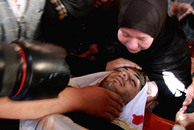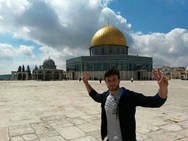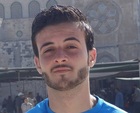25 sept 2015
|
|
Thousands of Palestinians marched in the funeral of Ahmad Izzat Khatatbeh, 25, who died on Thursday from wounds sustained by Israeli forces at the Beit Furik checkpoint, in the occupied West Bank, last week.
The procession set off from the Rafidia Government Hospital to Khatatbeh's family home located near the village’s entrance. His body was carried on the shoulders of fellow residents to the cemetery, as they shouted slogans calling for revenge. Mourners waved Palestinian flags as well as the flags of Palestinian factions during the funeral. Palestinian security sources told Ma'an that clashes erupted at the Beit Furik checkpoint between Israeli forces and dozens of youth following the march. Israeli forces fired tear-gas bombs and stun grenades at youths causing |
severe tear-gas inhalation. Medical sources said that a youth identified as Hammudeh Walid Hanini was injured with live bullets in the leg before being taken to the Rafidia Government Hospital for treatment.
Israeli forces also fired rubber-coated steel bullets at youths who responded with rocks and set several tires on fire.
An Israeli army spokesperson told Ma'an News Agency that she was unaware of any Palestinian injuries during the clashes, adding that an Israeli soldier had been lightly injured.
Khatatbeh had died from his wounds after being shot three times in the shoulder, chest and abdomen, medical sources said on Thursday.
An Israeli army spokesperson said at the time that a petrol bomb was thrown at an Israeli army patrol in the area, near the illegal settlement of Itamar, with soldiers responding by shooting a Palestinian suspect and arresting another.
He was the third Palestinian to die at the hands of Israeli forces in the occupied Palestinian territory this week.
Diya Abdul-Halim Talahmah, 21, was killed during clashes with Israeli forces in Hebron on Monday. On Tuesday, Israeli forces shot Hadeel al-Hashlamon, 18, several times at a Hebron checkpoint and she died from her wounds shortly after.
At least 26 Palestinians have been killed by Israeli forces since the start of 2015, as rights groups criticize the excessive use of force used by soldiers in the occupied Palestinian territory.
Israeli forces also fired rubber-coated steel bullets at youths who responded with rocks and set several tires on fire.
An Israeli army spokesperson told Ma'an News Agency that she was unaware of any Palestinian injuries during the clashes, adding that an Israeli soldier had been lightly injured.
Khatatbeh had died from his wounds after being shot three times in the shoulder, chest and abdomen, medical sources said on Thursday.
An Israeli army spokesperson said at the time that a petrol bomb was thrown at an Israeli army patrol in the area, near the illegal settlement of Itamar, with soldiers responding by shooting a Palestinian suspect and arresting another.
He was the third Palestinian to die at the hands of Israeli forces in the occupied Palestinian territory this week.
Diya Abdul-Halim Talahmah, 21, was killed during clashes with Israeli forces in Hebron on Monday. On Tuesday, Israeli forces shot Hadeel al-Hashlamon, 18, several times at a Hebron checkpoint and she died from her wounds shortly after.
At least 26 Palestinians have been killed by Israeli forces since the start of 2015, as rights groups criticize the excessive use of force used by soldiers in the occupied Palestinian territory.
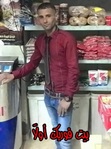
Ahmad Izzat Khatatbeh 26
A Palestinian shot and critically injured by Israeli forces, at a military checkpoint in eastern Nablus, last week, died from his wounds on Thursday, medics said.
Medical sources told Ma'an News Agency that Ahmad Izzat Khatatbeh, 26, died from his wounds after being shot three times in the shoulder, chest and abdomen at the Beit Forik checkpoint last Friday.
An Israeli army spokesperson said at the time that a petrol bomb was thrown at an Israeli army patrol in the area, near the illegal settlement of Itamar, with soldiers responding by shooting a Palestinian suspect and detaining another.
Khatatbeh's death comes a day after mourners marched en masse during the funeral of 18-year-old Hadeel al-Hashlamon, who was shot dead by Israeli forces on Wednesday at a Hebron checkpoint. Hadeel's death had followed that of another Palestinian who was killed in a village outside Hebron by an explosive device he intended to throw at a military vehicle, the army said.
Some residents provided a similar account of the man's death, while Palestinian security officials said the man, whom they identified as Dia al-Talahmeh, 21, had been shot dead by Israeli forces.
Khatatbeh's death Thursday brings the total number of Palestinians killed by Israeli forces since the start of 2015 to 26, according to UN documentation.
The number does not include Palestinian deaths caused by Israeli settlers.
A Palestinian shot and critically injured by Israeli forces, at a military checkpoint in eastern Nablus, last week, died from his wounds on Thursday, medics said.
Medical sources told Ma'an News Agency that Ahmad Izzat Khatatbeh, 26, died from his wounds after being shot three times in the shoulder, chest and abdomen at the Beit Forik checkpoint last Friday.
An Israeli army spokesperson said at the time that a petrol bomb was thrown at an Israeli army patrol in the area, near the illegal settlement of Itamar, with soldiers responding by shooting a Palestinian suspect and detaining another.
Khatatbeh's death comes a day after mourners marched en masse during the funeral of 18-year-old Hadeel al-Hashlamon, who was shot dead by Israeli forces on Wednesday at a Hebron checkpoint. Hadeel's death had followed that of another Palestinian who was killed in a village outside Hebron by an explosive device he intended to throw at a military vehicle, the army said.
Some residents provided a similar account of the man's death, while Palestinian security officials said the man, whom they identified as Dia al-Talahmeh, 21, had been shot dead by Israeli forces.
Khatatbeh's death Thursday brings the total number of Palestinians killed by Israeli forces since the start of 2015 to 26, according to UN documentation.
The number does not include Palestinian deaths caused by Israeli settlers.
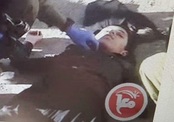
Hadil Hashlamoun
Deputy head of Hamas movement’s political bureau Ismail Haniyeh expressed in a telephone conversation his condolences to the father of Hadeel Hashlamoun who was killed Tuesday by Israeli fire at a military checkpoint.
During the phone conversation, Haniyeh expressed grief and offered condolences to the victim’s father.
Israeli occupation will pay high price for its crimes against the Palestinian people, he stressed.
Earlier Tuesday, 18-year-old Hadil Hashlamoun, dressed from head to toe in black and carrying a large purse, was shot at least 10 times at a checkpoint near the entrance of Shuhada Street, which was once the main commercial artery of al-Khalil (Hebron).
According to local Palestinian media, Israeli soldiers shot Hashlamoun after she refused to open her purse and lift her face veil (niqab).
The first-year student was left to bleed on the ground for at least half an hour as the soldiers prevented any medical team, including the Red Crescent, from reaching her.
The Israeli army claimed that Hashlamoun attempted to stab a soldier using a knife before shooting her in the legs. However, photos released by the Youth Against Settlements group showed Hashlamoun as posing no threat to the soldiers.
Deputy head of Hamas movement’s political bureau Ismail Haniyeh expressed in a telephone conversation his condolences to the father of Hadeel Hashlamoun who was killed Tuesday by Israeli fire at a military checkpoint.
During the phone conversation, Haniyeh expressed grief and offered condolences to the victim’s father.
Israeli occupation will pay high price for its crimes against the Palestinian people, he stressed.
Earlier Tuesday, 18-year-old Hadil Hashlamoun, dressed from head to toe in black and carrying a large purse, was shot at least 10 times at a checkpoint near the entrance of Shuhada Street, which was once the main commercial artery of al-Khalil (Hebron).
According to local Palestinian media, Israeli soldiers shot Hashlamoun after she refused to open her purse and lift her face veil (niqab).
The first-year student was left to bleed on the ground for at least half an hour as the soldiers prevented any medical team, including the Red Crescent, from reaching her.
The Israeli army claimed that Hashlamoun attempted to stab a soldier using a knife before shooting her in the legs. However, photos released by the Youth Against Settlements group showed Hashlamoun as posing no threat to the soldiers.
24 sept 2015
Their home was filled with people, the entire neighborhood overcrowded with Palestinians who rushed to the family's home, hoping to bid one last farewell to this young man, who was shot, dragged and killed by Israeli soldiers claiming he assaulted them.
Dia' Abdul-Halim Mahmoud Talahma, 21, from Kharsa town, near Doura, in the southern West Bank district of Hebron, left this life early, not by choice, or a disease, but because the Israeli army ended it.
Thousands of Palestinians rushed to his village, to his neighborhood and home, and held a massive funeral procession, in the streets and alleys, until they reached the local graveyard to bury his body.
"My son is a martyr; despite my grief, my ongoing pain and suffering, I am proud of him," she said, "We raise our heads high knowing he left this world defending Palestine and the Al-Aqsa Mosque."
"I never imagined this would be the last day I would see my son alive, standing on his two feet; he left our home in the morning, like any other day, heading to his college where he is studying to become a computer engineer - after school he went to work, then came back in the evening to eat dinner before he went to the gym."
"We heard what sounded like an explosion, and gunshots. Then social media pages were talking about a martyr, killed in the Kharsa junction area," she added, "I just knew; I felt it deep in my heart. It was my son."
"He was a wonderful young man, always smiling, loved and respected by all," the mother said, "He respected everybody, the elderly as well as the young… he just treated everybody with respect."
His sister, Wafa', said she received a call from her family, telling her a person was killed by the Israeli army, and it is very likely this person was her brother.
She rushed home to find it surrounded by soldiers, and that is when she realized it was her brother who had been killed.
Weeping and breathless, the sister said, "My kindhearted brother has left us. Every feast, my children and I would wait for him to visit us; his laughs and kind spirit were our feast, and joy, but now he is gone, and so is our joy; he was the most compassionate brother and friend."
His father, Abdul-Halim Talahma, was repeatedly kidnapped and imprisoned by Israel, and one of his sons was kidnapped by the army two and a half years ago, and is still in prison.
"What happened to us is a testimony to the entire world, exposing the Israeli crimes; they never differentiate between a fighter and an unarmed civilian; they just do not care. Every Palestinian is a legitimate target to them", Talahma, the mother of the deceased, stated, "The soldiers killed my son in a cold-blooded crime, and then they even prevented the medics from reaching him for three full hours."
Dia' was killed on Tuesday at dawn, September 22, and on that same fateful day, a young woman, identified as Hadeel Salaheddin Hashlamoun, 18 years of age, was shot dead by Israeli soldiers at a roadblock on Shuhada Street, in Hebron.
The first-year college student had the whole world in front of her, but the soldiers shot her in the abdomen and legs, and left her to bleed for 30 minutes after preventing local Red Crescent medics from reaching her.
Later, an Israeli ambulance took her to a hospital in Jerusalem, but she died of her serious wounds in the evening of the same day.
The Israeli army claimed she attacked soldiers on the roadblock, but eyewitness testimonies, and pictures, captured prior and after the shooting, showing a soldier pointing his gun at her and then showing her body on the ground, refuting the military allegations.
Dia' Abdul-Halim Mahmoud Talahma, 21, from Kharsa town, near Doura, in the southern West Bank district of Hebron, left this life early, not by choice, or a disease, but because the Israeli army ended it.
Thousands of Palestinians rushed to his village, to his neighborhood and home, and held a massive funeral procession, in the streets and alleys, until they reached the local graveyard to bury his body.
"My son is a martyr; despite my grief, my ongoing pain and suffering, I am proud of him," she said, "We raise our heads high knowing he left this world defending Palestine and the Al-Aqsa Mosque."
"I never imagined this would be the last day I would see my son alive, standing on his two feet; he left our home in the morning, like any other day, heading to his college where he is studying to become a computer engineer - after school he went to work, then came back in the evening to eat dinner before he went to the gym."
"We heard what sounded like an explosion, and gunshots. Then social media pages were talking about a martyr, killed in the Kharsa junction area," she added, "I just knew; I felt it deep in my heart. It was my son."
"He was a wonderful young man, always smiling, loved and respected by all," the mother said, "He respected everybody, the elderly as well as the young… he just treated everybody with respect."
His sister, Wafa', said she received a call from her family, telling her a person was killed by the Israeli army, and it is very likely this person was her brother.
She rushed home to find it surrounded by soldiers, and that is when she realized it was her brother who had been killed.
Weeping and breathless, the sister said, "My kindhearted brother has left us. Every feast, my children and I would wait for him to visit us; his laughs and kind spirit were our feast, and joy, but now he is gone, and so is our joy; he was the most compassionate brother and friend."
His father, Abdul-Halim Talahma, was repeatedly kidnapped and imprisoned by Israel, and one of his sons was kidnapped by the army two and a half years ago, and is still in prison.
"What happened to us is a testimony to the entire world, exposing the Israeli crimes; they never differentiate between a fighter and an unarmed civilian; they just do not care. Every Palestinian is a legitimate target to them", Talahma, the mother of the deceased, stated, "The soldiers killed my son in a cold-blooded crime, and then they even prevented the medics from reaching him for three full hours."
Dia' was killed on Tuesday at dawn, September 22, and on that same fateful day, a young woman, identified as Hadeel Salaheddin Hashlamoun, 18 years of age, was shot dead by Israeli soldiers at a roadblock on Shuhada Street, in Hebron.
The first-year college student had the whole world in front of her, but the soldiers shot her in the abdomen and legs, and left her to bleed for 30 minutes after preventing local Red Crescent medics from reaching her.
Later, an Israeli ambulance took her to a hospital in Jerusalem, but she died of her serious wounds in the evening of the same day.
The Israeli army claimed she attacked soldiers on the roadblock, but eyewitness testimonies, and pictures, captured prior and after the shooting, showing a soldier pointing his gun at her and then showing her body on the ground, refuting the military allegations.
23 sept 2015
|
|
Thousands of Palestinians marched Wednesday afternoon in the funeral of the Palestinian female teen who was shot dead on Tuesday by Israeli gunfire at a military checkpoint in al-Khalil.
Hadeel Hashlamoun, 18, died of her wounds sustained after Israeli occupation forces (IOF) shot her at close range and left her to bleed for more than a half an hour. Hadeel had asked to be searched by a female soldier or be sent back home, but was repeatedly shot by one of the soldiers, according to eyewitnesses. The mourners chanted slogans calling for revenge and for activating armed resistance in the West Bank. |
Hashlamon Laid to Rest, Witness Refutes Israeli Account of Death
Hundreds of mourners attended the funeral of 18-year-old Hadeel al-Hashlamon, on Wednesday, a day after the teenager was shot dead by Israeli forces at a checkpoint in Hebron, as a key eyewitness refuted claims she had attempted to stab Israeli soldiers.
Hundreds of mourners attended the funeral of Hadeel al-Hashlamon in Hebron on Wednesday.
Crowds of mourners carried the teenager's body through the city for her burial, condemning her killing and vowing revenge for the shooting.
Participants raised the flags of Palestinian political factions during the funeral, calling for unity in the face of Israel's military occupation.
She was then laid to rest in the martyrs cemetery in the city. Israeli forces had transferred al-Hashlamon's body to her family late Tuesday.
The 18-year-old was shot at a checkpoint at the entrance of Hebron's central al-Shuhada street, after allegedly attempting to stab an Israeli soldier, according to the Israeli army's official account. No Israeli soldiers were injured during the incident, and Israeli authorities presented no evidence of the alleged stabbing attempt.
'Shot seven times'
Hundreds of mourners attended the funeral of 18-year-old Hadeel al-Hashlamon, on Wednesday, a day after the teenager was shot dead by Israeli forces at a checkpoint in Hebron, as a key eyewitness refuted claims she had attempted to stab Israeli soldiers.
Hundreds of mourners attended the funeral of Hadeel al-Hashlamon in Hebron on Wednesday.
Crowds of mourners carried the teenager's body through the city for her burial, condemning her killing and vowing revenge for the shooting.
Participants raised the flags of Palestinian political factions during the funeral, calling for unity in the face of Israel's military occupation.
She was then laid to rest in the martyrs cemetery in the city. Israeli forces had transferred al-Hashlamon's body to her family late Tuesday.
The 18-year-old was shot at a checkpoint at the entrance of Hebron's central al-Shuhada street, after allegedly attempting to stab an Israeli soldier, according to the Israeli army's official account. No Israeli soldiers were injured during the incident, and Israeli authorities presented no evidence of the alleged stabbing attempt.
'Shot seven times'
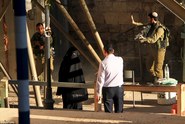
Another soldier is seen here joining the strand-off as a man in civilian attire seems to try to intervene. Shortly after this picture was taken, al-Hashlamon was shot dead
A key eyewitness to the incident, Fawaz Abu Aisha, who can be seen in pictures published by Youth Against Settlements, told Ma'an that he was on his way to work at 7:40 a.m. when he heard Israeli soldiers at the checkpoint in Shuhada Street shouting loudly in Hebrew.
At first he thought they were shouting at three Palestinian children he had seen in the area, but after approaching the checkpoint he saw they were talking to Hadeel, telling her to get away from the area.
Fawaz began to explain to the teenager, who did not understand Hebrew, what the Israeli soldiers were saying, and she attempted to leave the main checkpoint area via a movable barrier at the side. Israeli soldiers fired a warning shot at the ground and asked her to stop, before firing another warning shot. Abu Aisha asked the soldiers to let him explain to her what they were saying but they refused and told him to leave the area.
An Israeli soldier then fired a third warning shot at the teenager before aiming his weapon at her and shooting her in the left leg. One more shot was fired at her right leg and then four more into her chest and abdomen as she lay on the ground, Abu Aisha said.
Another shot was then fired at her body as she lay on the ground, he said. The eyewitness said the entire incident lasted around six minutes and Hadeel did not speak to the Israeli soldiers or resist in any way during that time.
An Israeli army spokeswoman said that an attack on soldiers at the checkpoint had been "thwarted." A local activist group, Youth Against Settlements, later released photos of the incident appearing to also contradict the army's account of events.
They appear to show the girl without any knife and at some distance from the soldiers before they opened fire.
Video footage from local new agency PalMedia, meanwhile, showed the teen left bleeding on the pavement, reportedly for up to 30 minutes, before she was roughly dragged away by an Israeli soldier, with soldiers and heavily armed settlers looked on.
A key eyewitness to the incident, Fawaz Abu Aisha, who can be seen in pictures published by Youth Against Settlements, told Ma'an that he was on his way to work at 7:40 a.m. when he heard Israeli soldiers at the checkpoint in Shuhada Street shouting loudly in Hebrew.
At first he thought they were shouting at three Palestinian children he had seen in the area, but after approaching the checkpoint he saw they were talking to Hadeel, telling her to get away from the area.
Fawaz began to explain to the teenager, who did not understand Hebrew, what the Israeli soldiers were saying, and she attempted to leave the main checkpoint area via a movable barrier at the side. Israeli soldiers fired a warning shot at the ground and asked her to stop, before firing another warning shot. Abu Aisha asked the soldiers to let him explain to her what they were saying but they refused and told him to leave the area.
An Israeli soldier then fired a third warning shot at the teenager before aiming his weapon at her and shooting her in the left leg. One more shot was fired at her right leg and then four more into her chest and abdomen as she lay on the ground, Abu Aisha said.
Another shot was then fired at her body as she lay on the ground, he said. The eyewitness said the entire incident lasted around six minutes and Hadeel did not speak to the Israeli soldiers or resist in any way during that time.
An Israeli army spokeswoman said that an attack on soldiers at the checkpoint had been "thwarted." A local activist group, Youth Against Settlements, later released photos of the incident appearing to also contradict the army's account of events.
They appear to show the girl without any knife and at some distance from the soldiers before they opened fire.
Video footage from local new agency PalMedia, meanwhile, showed the teen left bleeding on the pavement, reportedly for up to 30 minutes, before she was roughly dragged away by an Israeli soldier, with soldiers and heavily armed settlers looked on.
|
|
The Palestinian national unity government has asked the United Nations to form an investigative committee to look into the circumstances that led to the murder of Hadeel Hashlamoun, who was shot dead by the Israeli occupation soldiers in al-Khalil City.
The government said images captured and published by the Youth against Settlements Coalition, revealed that Hashlamoun posed no threat to the soldiers, and that the shooting, unlike military claims, was not justified. The occupation army claimed the young woman “attempted to stab a soldier," but the photos revealed she was not even close to any of the soldiers manning the Iron Gate of the Container Roadblock, in al-Khalil. The Palestinian government added that eyewitness reports revealed |
that after the teenage girl was shot with several live rounds, the occupation soldiers left her to bleed for over half an hour.
Medics of the Palestinian Red Crescent tried to reach the wounded young woman, but the soldiers prevented them from approaching her.
A video captured after the shooting, shows armed Israeli settlers gathering at the scene, smiling and chatting, before a soldier dragged the body of the woman to pull her from the sidewalk.
The Hamas resistance group mourned the death of 18-year-old Hadeel, vowing that no single drop of her blood shall go for free.
The group called on the national and international human rights organizations to document such Israeli crimes against the innocent Palestinians.
“Hadeel’s murder, among many other crimes committed by the Israeli occupation on a daily basis, leave no doubt that armed resistance is the only key to oust the Israeli occupation and prevent it from committing more crimes against the Palestinian people,” Hamas added.
Medics of the Palestinian Red Crescent tried to reach the wounded young woman, but the soldiers prevented them from approaching her.
A video captured after the shooting, shows armed Israeli settlers gathering at the scene, smiling and chatting, before a soldier dragged the body of the woman to pull her from the sidewalk.
The Hamas resistance group mourned the death of 18-year-old Hadeel, vowing that no single drop of her blood shall go for free.
The group called on the national and international human rights organizations to document such Israeli crimes against the innocent Palestinians.
“Hadeel’s murder, among many other crimes committed by the Israeli occupation on a daily basis, leave no doubt that armed resistance is the only key to oust the Israeli occupation and prevent it from committing more crimes against the Palestinian people,” Hamas added.
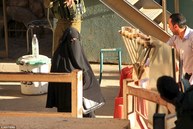
This is the moment an armed Israeli soldier was involved in a stand-off with a veiled Palestinian woman - just seconds before she was killed for trying to stab a serviceman to death.
Hadeel al-Hashlamon, 18, was shot at a West Bank checkpoint yesterday, as tensions continued to simmer ahead of this week's major Jewish and Muslim holidays.
Photographs taken in the moments before she was gunned down reveal how at least two soldiers had their guns trained on the veiled teenager just before she was killed.
Later the military said forces opened fire and 'identified a hit' following the incident in the West Bank city of Hebron.
The university student was taken to an Israeli hospital in a critical condition and her father, Salah al-Hashlamon, said she later died of her injuries. The soldier was not wounded.
Video has since emerged of the teenager lying on the ground at the check point moments after the shooting.
It shows soldiers watching on as her body is pulled out from under a fence while further footage shows medics on the scene and a man arriving with a stretcher.
According to local Palestinian media, she had been shot 10 times after refusing to reveal the contents of her purse or lift her face veil.
However an eyewitness told the New York Times that she was trying to show soldiers what was in her bag when she was shot.
A separate witness, Fawaz Abu Aisheh, 34, told the Times that she appeared to freeze as the drama unfolded - even when a soldier shot at her feet.
He is quoted as saying: 'She was like a nail, like she was in shock. I was shouting, ‘She doesn’t understand Hebrew!'
'Even if she had a knife, she would have to leap over a barrier about a meter high to reach a soldier,' he said, adding that there were up to seven soldiers with 'heavy weapons'.
The Middle East Eye news agency reported how there were claims that she was left lying on the street for half an hour before Israeli soldiers allowed doctors to reach her.
Earlier on Tuesday, the military said a 23-year-old Palestinian was found dead in a village near Hebron - allegedly after an explosive device he was handling went off.
The military said it arrived in the area to respond to rock throwing. The Palestinians said the circumstances behind the man's death were unclear.
The violence comes amid rising tensions surrounding Jerusalem's Al-Aqsa Mosque compound, known to Jews as the Temple Mount and to Muslims as the Noble Sanctuary. The site, holy to both Jews and Muslims, has been a flashpoint for violence in recent days.
Tensions boiled over last week on the eve of the Jewish new year holiday of Rosh Hashanah when Palestinians barricaded themselves inside the Al-Aqsa Mosque and, in clashes with police that would continue for days, threw rocks and firecrackers at officers. An Israeli man was also killed in Jerusalem when Palestinians pelted his car with rocks.
Several rockets from the Gaza Strip have also been fired recently, and Israel has deployed its Iron Dome rocket defense system in towns near the Palestinian territory.
Speaking in Paris on Tuesday, Palestinian President Mahmoud Abbas called for an end to the violence. 'It's extremely dangerous. We don't want to see this continue,' he told the media after a meeting with French President Francois Hollande.
Ahead of the Yom Kippur fast, which began Tuesday evening, Israel reinstated a rule banning Muslim men under age 40 from the Al-Aqsa Mosque as a measure to ensure calm during the holiday. It also said West Bank and Gaza crossings would be closed during the holiday, and would reopen Wednesday.
Police said security will be beefed up during the 25-hour fast, which comes two days ahead of the Muslim Eid al-Adha holiday, also known as the Festival of Sacrifice.
Eid al-Adha commemorates the willingness of the prophet Ibrahim - or Abraham as he is known in the Bible - to sacrifice his son in accordance with God's will, though in the end God provides him a sheep to sacrifice instead.
Near the Al-Aqsa Mosque compound, police were seen preventing men and women from entering the mosque Tuesday.
Police spokesman Micky Rosenfeld said some women were being barred from entering because they were part of an outlawed group that sees itself as defenders of the Muslim holy site and tries to disrupt Jewish visits to the site.
The age limit for men at Al-Aqsa has been put in place intermittently after protests erupted at the site, with mostly younger Palestinians throwing rocks clashing with police at the compound and elsewhere.
Hadeel al-Hashlamon, 18, was shot at a West Bank checkpoint yesterday, as tensions continued to simmer ahead of this week's major Jewish and Muslim holidays.
Photographs taken in the moments before she was gunned down reveal how at least two soldiers had their guns trained on the veiled teenager just before she was killed.
Later the military said forces opened fire and 'identified a hit' following the incident in the West Bank city of Hebron.
The university student was taken to an Israeli hospital in a critical condition and her father, Salah al-Hashlamon, said she later died of her injuries. The soldier was not wounded.
Video has since emerged of the teenager lying on the ground at the check point moments after the shooting.
It shows soldiers watching on as her body is pulled out from under a fence while further footage shows medics on the scene and a man arriving with a stretcher.
According to local Palestinian media, she had been shot 10 times after refusing to reveal the contents of her purse or lift her face veil.
However an eyewitness told the New York Times that she was trying to show soldiers what was in her bag when she was shot.
A separate witness, Fawaz Abu Aisheh, 34, told the Times that she appeared to freeze as the drama unfolded - even when a soldier shot at her feet.
He is quoted as saying: 'She was like a nail, like she was in shock. I was shouting, ‘She doesn’t understand Hebrew!'
'Even if she had a knife, she would have to leap over a barrier about a meter high to reach a soldier,' he said, adding that there were up to seven soldiers with 'heavy weapons'.
The Middle East Eye news agency reported how there were claims that she was left lying on the street for half an hour before Israeli soldiers allowed doctors to reach her.
Earlier on Tuesday, the military said a 23-year-old Palestinian was found dead in a village near Hebron - allegedly after an explosive device he was handling went off.
The military said it arrived in the area to respond to rock throwing. The Palestinians said the circumstances behind the man's death were unclear.
The violence comes amid rising tensions surrounding Jerusalem's Al-Aqsa Mosque compound, known to Jews as the Temple Mount and to Muslims as the Noble Sanctuary. The site, holy to both Jews and Muslims, has been a flashpoint for violence in recent days.
Tensions boiled over last week on the eve of the Jewish new year holiday of Rosh Hashanah when Palestinians barricaded themselves inside the Al-Aqsa Mosque and, in clashes with police that would continue for days, threw rocks and firecrackers at officers. An Israeli man was also killed in Jerusalem when Palestinians pelted his car with rocks.
Several rockets from the Gaza Strip have also been fired recently, and Israel has deployed its Iron Dome rocket defense system in towns near the Palestinian territory.
Speaking in Paris on Tuesday, Palestinian President Mahmoud Abbas called for an end to the violence. 'It's extremely dangerous. We don't want to see this continue,' he told the media after a meeting with French President Francois Hollande.
Ahead of the Yom Kippur fast, which began Tuesday evening, Israel reinstated a rule banning Muslim men under age 40 from the Al-Aqsa Mosque as a measure to ensure calm during the holiday. It also said West Bank and Gaza crossings would be closed during the holiday, and would reopen Wednesday.
Police said security will be beefed up during the 25-hour fast, which comes two days ahead of the Muslim Eid al-Adha holiday, also known as the Festival of Sacrifice.
Eid al-Adha commemorates the willingness of the prophet Ibrahim - or Abraham as he is known in the Bible - to sacrifice his son in accordance with God's will, though in the end God provides him a sheep to sacrifice instead.
Near the Al-Aqsa Mosque compound, police were seen preventing men and women from entering the mosque Tuesday.
Police spokesman Micky Rosenfeld said some women were being barred from entering because they were part of an outlawed group that sees itself as defenders of the Muslim holy site and tries to disrupt Jewish visits to the site.
The age limit for men at Al-Aqsa has been put in place intermittently after protests erupted at the site, with mostly younger Palestinians throwing rocks clashing with police at the compound and elsewhere.
22 sept 2015
|
|
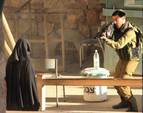
Hadeel Hashlamoun 18, at the Israeli checkpoint just before being shot
Hadeel Hashlamoun, 18, was critically injured and later died of her wounds on Tuesday afternoon, when soldiers shot her at an Israeli military checkpoint in Al Shohada Street in Hebron old city. Media sources in Hebron said Hadeel was injury in her abdomen, and that the soldiers left her bleeding onto the ground for nearly 30 minutes, and prevented Palestinian medics from approach her. The Israeli army claims the young woman attempted to stab a soldier. A Photo by the Palestine News Agency – WAFA shows Hadeel just before being shoot by the Israeli soldiers with nothing in her hands. The Israeli military initially said the woman was shot in her legs, and later said she is in a critical condition. She was moved to Shaare Zedek Medical Center in Jerusalem where she died of her wounds. According to her family Hadeel was a first-year student at the Hebron University. The Palestinian government issued a statement on Tuesday condemning the killing of Hadeel and demanded and international and independent investigation into the incident. Video Video Police reinforcements flood West Bank, Jerusalem ahead of Yom Kippur Palestinian dies in explosion overnight; soldiers prevent stabbing |
attack; Temple Mount access limited as authorities prepare for violence on Jewish holy day.
Thousands of police forces were deployed to high-tension areas Tuesday morning and troops were placed on high alert in preparation for Yom Kippur as Defense Minister Moshe Ya'alon ordered the complete closure of the West Bank and Gaza to begin at noon until midnight Wednesday.
Fears of security incidents in the West Bank and East Jerusalem for Yom Kippur already seemed to be legitimate overnight Monday when a Palestinian died just south of Hebron after security forces entered the area in response to reports of a stone barrier that had been erected in the town of Beit Hagai. An explosion was heard and troops found the body of the Palestinian nearby.
Current assessments suggest that the 23-year-old individual was trying to throw a grenade at the soldiers when it exploded in his hands. Violence continued into Tuesday morning when a woman attempted to stab a IDF soldier at a checkpoint in Hebron. The female was shot in the leg and seriously wounded before being evacuated by the Red Crescent to a nearby medical facility. The soldier was unharmed.
The incidents followed over a week of increased tensions in the West Bank and East Jerusalem - a week marred by riots and attacks, mainly by use of stones and firebombs. In response to the deteriorating security situation, Prime Minister Benjamin Netanyahu was granted legal permission by Attorney General Yehuda Weinstein to arm snipers with the Ruger Precision Rifle and to fire at individuals endangering public safety with intention to wound them.
After a situation assessment, police decided to restrict entrance to the Temple Mount on Tuesday to Palestinians over the age of 40 in an effort to decrease the likelihood of violence and protect the thousands of Jews expected to pray at the Western Wall for Yom Kippur.
Meanwhile, volunteers of the Israeli Civil Guard, in coordination with police, will provide armed security at local Synagogues throughout the country. As on every Yom Kippur, roadblocks were erected to prevent vehicular traffic from East Jerusalem into the west, to prevent the likelihood of confrontation.
The Yom Kippur fast will begin in Jerusalem at 6:01pm, in Tel Aviv at 6:16pm, in Haifa at 6:07pm and in Be'er Sheva at 6:18pm. The fast ends on Wednesday in Jerusalem at 7:11pm, in Tel Aviv at 7:13, in Haifa at 7:13 and in Be'er Sheva at 7:13pm.
Public transit throughout the country, including buses and trains, will stop between 1:30pm to 3pm and begin again on Wednesday evening after 8:30pm.
Thousands of police forces were deployed to high-tension areas Tuesday morning and troops were placed on high alert in preparation for Yom Kippur as Defense Minister Moshe Ya'alon ordered the complete closure of the West Bank and Gaza to begin at noon until midnight Wednesday.
Fears of security incidents in the West Bank and East Jerusalem for Yom Kippur already seemed to be legitimate overnight Monday when a Palestinian died just south of Hebron after security forces entered the area in response to reports of a stone barrier that had been erected in the town of Beit Hagai. An explosion was heard and troops found the body of the Palestinian nearby.
Current assessments suggest that the 23-year-old individual was trying to throw a grenade at the soldiers when it exploded in his hands. Violence continued into Tuesday morning when a woman attempted to stab a IDF soldier at a checkpoint in Hebron. The female was shot in the leg and seriously wounded before being evacuated by the Red Crescent to a nearby medical facility. The soldier was unharmed.
The incidents followed over a week of increased tensions in the West Bank and East Jerusalem - a week marred by riots and attacks, mainly by use of stones and firebombs. In response to the deteriorating security situation, Prime Minister Benjamin Netanyahu was granted legal permission by Attorney General Yehuda Weinstein to arm snipers with the Ruger Precision Rifle and to fire at individuals endangering public safety with intention to wound them.
After a situation assessment, police decided to restrict entrance to the Temple Mount on Tuesday to Palestinians over the age of 40 in an effort to decrease the likelihood of violence and protect the thousands of Jews expected to pray at the Western Wall for Yom Kippur.
Meanwhile, volunteers of the Israeli Civil Guard, in coordination with police, will provide armed security at local Synagogues throughout the country. As on every Yom Kippur, roadblocks were erected to prevent vehicular traffic from East Jerusalem into the west, to prevent the likelihood of confrontation.
The Yom Kippur fast will begin in Jerusalem at 6:01pm, in Tel Aviv at 6:16pm, in Haifa at 6:07pm and in Be'er Sheva at 6:18pm. The fast ends on Wednesday in Jerusalem at 7:11pm, in Tel Aviv at 7:13, in Haifa at 7:13 and in Be'er Sheva at 7:13pm.
Public transit throughout the country, including buses and trains, will stop between 1:30pm to 3pm and begin again on Wednesday evening after 8:30pm.
The Movement called on PA to stop persecuting Palestinian youths in the West Bank for their political affiliation.
For its part, the Popular Front for the Liberation of Palestine (PFLP) said that al-Talahma’s assassination and all Israeli crimes will never go without punishment.
The PFLP called on the international community to stop Israeli escalated crimes against Palestinian people in occupied Jerusalem, Gaza, and West Bank.
22-year-old Dhiaa al-Talahma, a student at al-Quds University, was shot dead at dawn Tuesday by the Israeli occupation forces (IOF) in al-Khalil’s town of Dura, in the southern West Bank.
A PIC journalist quoted the casualty’s family as stating that the Israeli occupation troops shot Dhiaa with live ammunition in his head at the Kharsa crossroads.
Dhiaa kept bleeding for long hours as the IOF prevented the ambulance crews from reaching him. Dhiaa was later handed dead to the ambulance personnel. Video
For its part, the Popular Front for the Liberation of Palestine (PFLP) said that al-Talahma’s assassination and all Israeli crimes will never go without punishment.
The PFLP called on the international community to stop Israeli escalated crimes against Palestinian people in occupied Jerusalem, Gaza, and West Bank.
22-year-old Dhiaa al-Talahma, a student at al-Quds University, was shot dead at dawn Tuesday by the Israeli occupation forces (IOF) in al-Khalil’s town of Dura, in the southern West Bank.
A PIC journalist quoted the casualty’s family as stating that the Israeli occupation troops shot Dhiaa with live ammunition in his head at the Kharsa crossroads.
Dhiaa kept bleeding for long hours as the IOF prevented the ambulance crews from reaching him. Dhiaa was later handed dead to the ambulance personnel. Video
21 sept 2015
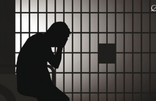
Ahmad Shihda Shatat, 32
A Palestinian prisoner, held by Israel on criminal charges, in the Nativot prison, died due to circumstances and conditions that remain unknown. Israel said it would be conducting an autopsy to determine the causes of death. Palestinian official demands thorough investigation.
The prisoner, Ahmad Shihda Shatat, 32, is from the Thaheriyya town, in the southern West Bank district of Hebron.
The Israeli Police said it would be conducting an autopsy to determine the cause of death, and the circumstances that led to this outcome.
Abdul-Nasser Ferwana, a former political prisoner and the head of the Census Department of the Palestinian Detainees and Ex-Detainees Commission, said that “regardless of why the prisoner was held by Israel, and even if he was held on criminal charges, the incident should not be ignored.”
Ferwana added that a thorough, and credible, investigation must be conducted, to determine the circumstances that led to his death in Israeli prison, “it is unethical, and illogical, to ignore this case,” he said.
“It is our moral and legal responsibility to follow-up on the issue,” Ferwana stated, “He is a prisoner who died in prison. Even if he was being held on criminal charges, the fact remains he died in prison.”
Some Israel sources claimed the prisoner “committed suicide,” but failed to provide further details on issue, including on how, or what did he use to commit the alleged suicide.
Palestinian detainee dies in Israeli police station
A Palestinian detainee was found dead in an Israeli police station in the Negev in southern 1948 occupied territories, Israeli sources said.
The unidentified Palestinian detainee died due to circumstances and conditions that still remain unknown, Israeli police said.
An investigation would be opened into the circumstances that led to his death, the sources added.
Palestinian prisoners, held in Israeli jails and detention centers, are subjected to systematic torture to extract information and confessions from them.
A Palestinian prisoner, held by Israel on criminal charges, in the Nativot prison, died due to circumstances and conditions that remain unknown. Israel said it would be conducting an autopsy to determine the causes of death. Palestinian official demands thorough investigation.
The prisoner, Ahmad Shihda Shatat, 32, is from the Thaheriyya town, in the southern West Bank district of Hebron.
The Israeli Police said it would be conducting an autopsy to determine the cause of death, and the circumstances that led to this outcome.
Abdul-Nasser Ferwana, a former political prisoner and the head of the Census Department of the Palestinian Detainees and Ex-Detainees Commission, said that “regardless of why the prisoner was held by Israel, and even if he was held on criminal charges, the incident should not be ignored.”
Ferwana added that a thorough, and credible, investigation must be conducted, to determine the circumstances that led to his death in Israeli prison, “it is unethical, and illogical, to ignore this case,” he said.
“It is our moral and legal responsibility to follow-up on the issue,” Ferwana stated, “He is a prisoner who died in prison. Even if he was being held on criminal charges, the fact remains he died in prison.”
Some Israel sources claimed the prisoner “committed suicide,” but failed to provide further details on issue, including on how, or what did he use to commit the alleged suicide.
Palestinian detainee dies in Israeli police station
A Palestinian detainee was found dead in an Israeli police station in the Negev in southern 1948 occupied territories, Israeli sources said.
The unidentified Palestinian detainee died due to circumstances and conditions that still remain unknown, Israeli police said.
An investigation would be opened into the circumstances that led to his death, the sources added.
Palestinian prisoners, held in Israeli jails and detention centers, are subjected to systematic torture to extract information and confessions from them.
